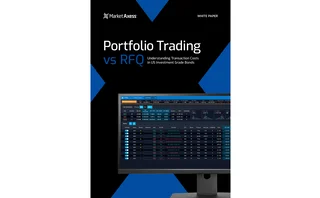Golden Copy: Maybe It's Not a Tale of Two Identifiers
Could there be a standard that helps market participants find liquidity?

The Big Short won an Oscar on Sunday, and the film has gotten a lot of praise in the media for rendering accessible the complexities behind the financial crash of 2008. Not everyone liked the movie, though. Commentators who work in finance are defensive about its moral message (bankers' greed destroyed the economy) and have criticized its depiction of the role of synthetic derivatives in the crash as exaggerated.
Personally, I enjoyed The Big Short, though it works better as an "edutainment" primer on the crash than as a movie, since it spends so much time explaining collateralized debt obligations and credit default swaps that there's not much time left for character arcs.
What the movie and its critical reception did make clear was that derivatives have gotten some bad press, and this has not been helped either by the complexity of the instruments themselves or by the opacity of the institutions that trade in them. This means that officials all over the world have made a point of regulating derivatives since the crash, or at least loudly calling for their regulation, and they have to be seen to be enforcing this. In Europe, over-the-counter derivatives now fall under the purview of the Markets in Financial Instruments Directive (MiFID II), which is scheduled to go live in January 2018.
Now, in order to regulate a thing, you have to be able to talk about that thing and have others know precisely what you are talking about when you talk about it. And that is why, lately, a debate has been raging around the arcane and—to the uninitiated—perplexingly dull issue of the use of International Securities Identification Numbers (ISINs) for identifying derivatives for reporting under MiFID II. "Raging" is perhaps an exaggeration, since the debate is playing out mostly very politely in study groups, at industry events, on blogs and in trade publications such as Inside Reference Data, among a handful of cognoscenti.
The European Securities and Markets Authority (ESMA) has gone with the ISO-backed ISIN despite objections from market participants during consultations on the subject, probably because it's keen to stick to ISO standards, and not, as some have suggested, because the regulatory agency doesn't know what it's doing. But some market participants argue that ISINs are not fit for purpose for identifying boutique instruments such as options, swaps and futures.
Among these critics is Bloomberg's Open Symbology team, which has posited the Financial Instrument Global identifier (FIGI) as an alternative. Some in the industry are framing the issue as a contest between the two codes.
What hasn't been discussed as much is the use of the codes beyond reporting. What do users themselves want? I have heard the point made that there isn't a lot of difference between the ISIN and the FIGI—conceptually, both are anachronistic.
What is needed for OTC derivatives identification is a genuine alternative that would not only satisfy regulatory imperatives, but also aid price discovery. In addition to offering a view of enterprise and systemic risk, identifiers can also provide a view of liquidity. There have been other efforts by industry bodies to discuss identification for derivatives, and representatives from these organizations are also helping to develop the ISIN. If these efforts and discussions are framed by considerations broader than MiFID II, these identifiers could contribute to the sustainability of the market itself.
Only users who have a paid subscription or are part of a corporate subscription are able to print or copy content.
To access these options, along with all other subscription benefits, please contact info@waterstechnology.com or view our subscription options here: http://subscriptions.waterstechnology.com/subscribe
You are currently unable to print this content. Please contact info@waterstechnology.com to find out more.
You are currently unable to copy this content. Please contact info@waterstechnology.com to find out more.
Copyright Infopro Digital Limited. All rights reserved.
As outlined in our terms and conditions, https://www.infopro-digital.com/terms-and-conditions/subscriptions/ (point 2.4), printing is limited to a single copy.
If you would like to purchase additional rights please email info@waterstechnology.com
Copyright Infopro Digital Limited. All rights reserved.
You may share this content using our article tools. As outlined in our terms and conditions, https://www.infopro-digital.com/terms-and-conditions/subscriptions/ (clause 2.4), an Authorised User may only make one copy of the materials for their own personal use. You must also comply with the restrictions in clause 2.5.
If you would like to purchase additional rights please email info@waterstechnology.com
More on Trading Tech
Band-aids vs build-outs: Best practices for exchange software migrations
Heetesh Rawal writes that legacy exchange systems are under pressure to scale to support new asset classes and greater volumes, leaving exchange operators with a stark choice: patch up outdated systems and hope for the best or embark on risky but rewarding replacement projects.
Portfolio trading vs RFQ: Understanding transaction costs in US investment-grade bonds
The MarketAxess research team explores how such factors as order size, liquidity profiles and associated costs determine whether a portfolio trade or an RFQ list trade is the optimal choice.
IEX, MEMX spar over new exchange’s now-approved infrastructure model
As more exchanges look to operate around-the-clock venues, the disagreement has put the practices of market tech infrastructure providers under a microscope.
The Waters Cooler: The Thanksgiving debrief
Maybe we shouldn’t use AI for EVERYTHING! I’m talking to YOU, Spotify!
LSEG shelves replatforming project for FX Matching venues
After EBS migration, dealers had little appetite for another major technology project
As vulnerability patching gets overwhelming, it’s no-code’s time to shine
Waters Wrap: A large US bank is going all in on a no-code provider in an effort to move away from its Java stack. The bank’s CIO tells Anthony they expect more CIOs to follow this dev movement.
Too ’Berg to fail? What October’s Instant Bloomberg outage means for the industry
The ubiquitous communications platform is vital for traders around the globe, especially in fixed income and exotic derivatives. When it fails, the disruption can be great.
How a consolidated tape could address bond liquidity fragmentation
Chris Murphy, CEO of Ediphy, writes that the biggest goal of a fixed-income tape should be the aggregation of, and democratized access to, market data.







